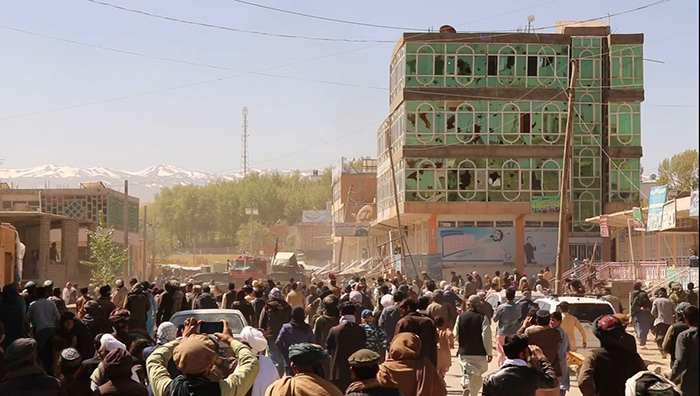On May 09, hundreds of civilians in central Ghor province took to street to protest against what they called unjust distribution of aid packages supplied by a Qatari charity organization. The protest turned violent when the angry mob tried to break into building of governor office. To disperse the mob, the security forces, under directive of local authorities, opened fire at mob which left six people including a local journalist dead and 19 others wounded.
Talking to Kabul Now, Mohammad Naser Khazi, governor of the central Ghor province, confirmed that six people, including two police forces, were killed and more than 12 others were wounded. “Some protesters attacked on government facilities in a very aggressive manner which led to chaos,” the governor said. A government delegation has been tasked to investigate the case.
According to local authorities, a Qatari charity organization has donated basic food materials to 1,000 families in Ferozkoh, capital city of Ghor, and to 500 families in Du Layna district of the province.
The governor, however, claims that some people exploited the protest, attempting to attack on government facilities after they did not receive aid packages.
Fazulhaq Ehsan, the head of Ghor Provincial Council, describes severe poverty in the central province as “disastrous”. He says a dire poverty, which has reached to almost unendurable point, forces Ghor residents to take a rebellious action. “We are concerned about growing poverty in Ghor. People get killed and wounded for bread in the month of Ramadan,” he said.
Describing the violent protest and death of protesters and security forces as “shocking”, Amruallah Saleh, Ashraf Ghani’s First Vice President, says security forces shouldn’t get involvement in bread distribution programs. Mr. Saleh says community structure—local elders and community representatives—can help the local government to distribute aid package properly. Hassan Hakimi, an activist in Ghor, talking to Kabul Now, urged Afghanistan Independent Human Rights Commission, UNAMA, the Afghan Parliament, and civil society to study why a peaceful protest turned violent in Ghor.

Protesters accused of firing at security forces
According to Ghor Police Department, some armed people who were present among crowd of protesters have fired at security forces on purpose to turn the peaceful protest violent.
“The protesters started to hit security forces. We used water cannons and other harmless means to stop them. Unfortunately, some armed people, who infiltrated into the mob of protesters, fired at government forces,” said Amin Ahmadzai, police chief of Ghor province. He said Ghor police would find and arrest those who were behind gunfire at police forces. Mr. Ahmadzai added they would try to resolve dispute between protesters and police forces through mediation of local elders.
The governor, Mohammad Naser Khazi, however, said that claims made by the police chief will be investigated.
Aid packages are not distributed equally
Based on accounts by Ghor protesters, aid packages donated by a Qatari charity organization were not distributed equally among those needy who have hardly been hit by financial effects of lockdown and outbreak of the pandemic Covid-19. Ghor protesters blame local government for unjust distribution of relief packages, saying that they would continue to protest against unjust behavior of local government.
Niaz Mohammad, who says he cannot afford to earn living costs of his family, is asking charity organizations for help. “There is no employment since the coronavirus outbreak. Our children will die of starvation. They (government officials) are not aware of poor people,” he said.
“The aid packages are not distributed fairly,” said another protester, Abdul Rahim.
The civil activist, Hassan Hakimi, says local government cannot manage distribution of aid packages as properly as it should be managed. “Some people disguised as refugees are misusing aid distribution. Those in urgent need of relief packages are being ignored and this needs to be changed,” he noted.
Local government of Ghor has issued ration cards for 3,008 families who were identified in urgent need of aid package. Local authorities say they will issue another 3000 ration cards for needy families.
The governor, however, says the local government would soon undertake distribution of wheat donated by India. He says thata the government would raise more funds to supply more aid for the needy people in Ghor province.
Inflation
With the outbreak of coronavirus and after a key bridge on Herat-Ghor highway was destroyed, prices of basic food materials have raised by 30 percent. Poor people cannot afford buying basic materials, according to local officials and Ghor civil society activists.
Mr. Khazi, asserts that rise in prices is related with the destruction of the bridge, remoteness of the province, and extortion of the Taliban militant across the highway.
According to him, the province has an estimated population of 800,000 and 60 percent of the population live below the poverty line.
Head of the provincial council, Mr. Ehsan, accuses the central government of neglecting the province.




